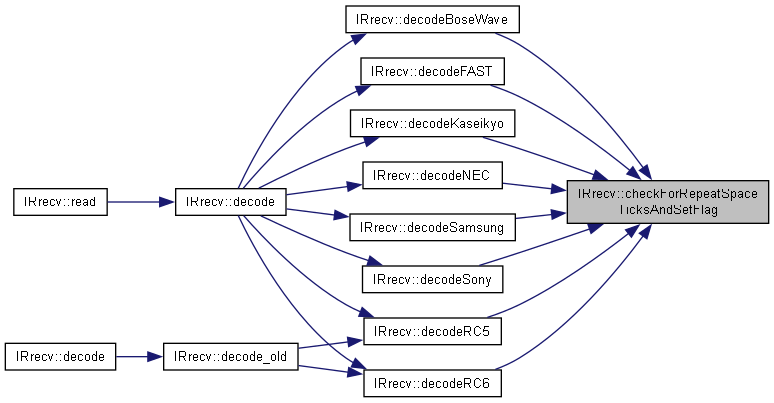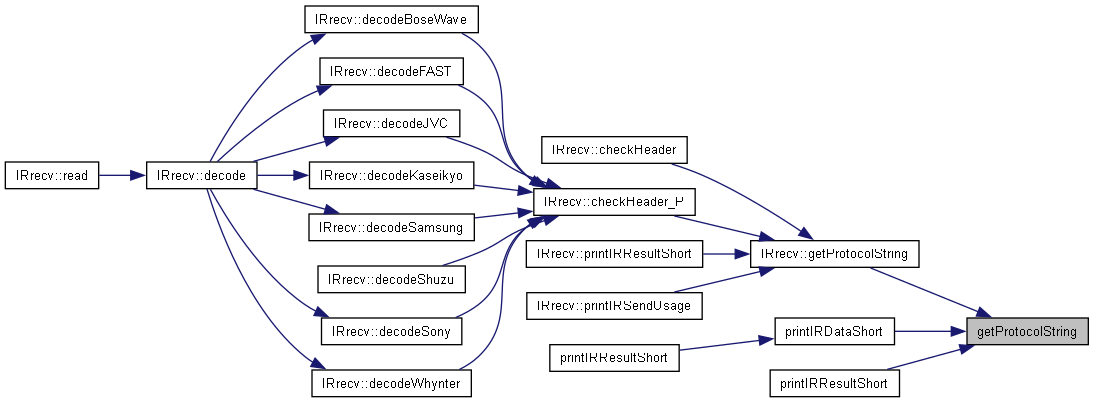Macros | |
| #define | FNV_PRIME_32 16777619 |
| used for decodeHash() More... | |
| #define | FNV_BASIS_32 2166136261 |
| used for decodeHash() More... | |
Functions | |
| const char * | getProtocolString (decode_type_t aProtocol) |
| void | IRReceiveTimerInterruptHandler () |
| bool | matchTicks (uint16_t aMeasuredTicks, uint16_t aMatchValueMicros) |
| Match function WITHOUT compensating for marks exceeded or spaces shortened by demodulator hardware. More... | |
| bool | matchTicks (uint16_t aMeasuredTicks, uint16_t aMatchValueMicros, int16_t aCompensationMicrosForTicks) |
| Match function WITH compensating for marks exceeded or spaces shortened by demodulator hardware. More... | |
| bool | MATCH (uint16_t measured_ticks, uint16_t desired_us) |
| bool | matchMark (uint16_t aMeasuredTicks, uint16_t aMatchValueMicros) |
| Compensate for marks exceeded by demodulator hardware. More... | |
| bool | MATCH_MARK (uint16_t measured_ticks, uint16_t desired_us) |
| bool | matchSpace (uint16_t aMeasuredTicks, uint16_t aMatchValueMicros) |
| Compensate for spaces shortened by demodulator hardware. More... | |
| bool | MATCH_SPACE (uint16_t measured_ticks, uint16_t desired_us) |
| int | getMarkExcessMicros () |
| Getter function for MARK_EXCESS_MICROS. More... | |
| void | printActiveIRProtocols (Print *aSerial) |
| IRrecv::IRrecv () | |
| Instantiate the IRrecv class. More... | |
| IRrecv::IRrecv (uint_fast8_t aReceivePin) __attribute__((deprecated("Please use the default IRrecv instance \"IrReceiver\" and IrReceiver.begin() | |
| IRrecv::IRrecv (uint_fast8_t aReceivePin, uint_fast8_t aFeedbackLEDPin) __attribute__((deprecated("Please use the default IRrecv instance \"IrReceiver\" and IrReceiver.begin() | |
| Instantiate the IRrecv class. More... | |
| void | IRrecv::ReceiveInterruptHandler () |
| void | IRrecv::begin (uint_fast8_t aReceivePin, bool aEnableLEDFeedback=false, uint_fast8_t aFeedbackLEDPin=USE_DEFAULT_FEEDBACK_LED_PIN) |
| Initializes the receive and feedback pin. More... | |
| void | IRrecv::setReceivePin (uint_fast8_t aReceivePinNumber) |
| Sets / changes the receiver pin number. More... | |
| void | IRrecv::registerReceiveCompleteCallback (void(*aReceiveCompleteCallbackFunction)(void)) |
| Sets the function to call if a complete protocol frame has arrived. More... | |
| void | IRrecv::start () |
| Start the receiving process. More... | |
| void | IRrecv::restartTimer () |
| void | IRrecv::enableIRIn () |
| Alias for start(). More... | |
| void | IRrecv::restartTimer (uint32_t aMicrosecondsToAddToGapCounter) |
| Configures the timer and the state machine for IR reception. More... | |
| void | IRrecv::restartTimerWithTicksToAdd (uint16_t aTicksToAddToGapCounter) |
| Configures the timer and the state machine for IR reception. More... | |
| void | IRrecv::restartAfterSend () |
| Restarts receiver after send. More... | |
| void | IRrecv::stop () |
| Disables the timer for IR reception. More... | |
| void | IRrecv::stopTimer () |
| void | IRrecv::disableIRIn () |
| Alias for stop(). More... | |
| void | IRrecv::end () |
| Alias for stop(). More... | |
| bool | IRrecv::isIdle () |
| Returns status of reception. More... | |
| void | IRrecv::resume () |
| Restart the ISR (Interrupt Service Routine) state machine, to enable receiving of the next IR frame. More... | |
| void | IRrecv::initDecodedIRData () |
| Is internally called by decode before calling decoders. More... | |
| bool | IRrecv::available () |
| Returns true if IR receiver data is available. More... | |
| IRData * | IRrecv::read () |
| Returns pointer to IrReceiver.decodedIRData if IR receiver data is available, else nullptr. More... | |
| bool | IRrecv::decode () |
| The main decode function, attempts to decode the recently receive IR signal. More... | |
| void | IRrecv::decodePulseDistanceWidthData (uint_fast8_t aNumberOfBits, IRRawlenType aStartOffset, uint16_t aOneMicros, bool aIsPulseWidthProtocol, bool aMSBfirst) |
| Decode pulse distance width protocols. More... | |
| void | IRrecv::decodeWithThresholdPulseDistanceWidthData (uint_fast8_t aNumberOfBits, IRRawlenType aStartOffset, uint16_t aOneThresholdMicros, bool aIsPulseWidthProtocol, bool aMSBfirst) |
| New threshold decoder to be activated by USE_THRESHOLD_DECODER Assumes a 0 for shorter and a 1 for longer timing. More... | |
| void | IRrecv::decodePulseDistanceWidthData (uint_fast8_t aNumberOfBits, IRRawlenType aStartOffset, uint16_t aOneMarkMicros, uint16_t aOneSpaceMicros, uint16_t aZeroMarkMicros, bool aMSBfirst) |
| Old deprecated version with 3 timing parameters instead of one and a aIsPulseWidthProtocol flag. More... | |
| void | IRrecv::decodePulseDistanceWidthData (uint_fast8_t aNumberOfBits, IRRawlenType aStartOffset, uint16_t aOneMarkMicros, uint16_t aZeroMarkMicros, uint16_t aOneSpaceMicros, uint16_t aZeroSpaceMicros, bool aMSBfirst) __attribute__((deprecated("Please use decodePulseDistanceWidthData() with 6 parameters."))) |
| bool | IRrecv::decodeStrictPulseDistanceWidthData (uint_fast8_t aNumberOfBits, IRRawlenType aStartOffset, uint16_t aOneMarkMicros, uint16_t aOneSpaceMicros, uint16_t aZeroMarkMicros, uint16_t aZeroSpaceMicros, bool aMSBfirst) |
| void | IRrecv::decodePulseDistanceWidthData (PulseDistanceWidthProtocolConstants *aProtocolConstants, uint_fast8_t aNumberOfBits, IRRawlenType aStartOffset=3) |
| Decode pulse distance protocols for PulseDistanceWidthProtocolConstants. More... | |
| void | IRrecv::decodePulseDistanceWidthData_P (PulseDistanceWidthProtocolConstants const *aProtocolConstantsPGM, uint_fast8_t aNumberOfBits, IRRawlenType aStartOffset=3) |
| void | IRrecv::initBiphaselevel (uint_fast8_t aRCDecodeRawbuffOffset, uint16_t aBiphaseTimeUnit) |
| uint_fast8_t | IRrecv::getBiphaselevel () |
| Gets the level of one time interval (aBiphaseTimeUnit) at a time from the raw buffer. More... | |
| uint_fast8_t | IRrecv::compare (uint16_t oldval, uint16_t newval) |
| Compare two (tick) values for Hash decoder Use a tolerance of 20% to enable e.g. More... | |
| bool | IRrecv::decodeHash () |
| Decodes an arbitrary IR code to a 32-bit value. More... | |
| bool | IRrecv::decodeHashOld (decode_results *aResults) |
| bool | IRrecv::checkHeader (PulseDistanceWidthProtocolConstants *aProtocolConstants) |
| bool | IRrecv::checkHeader_P (PulseDistanceWidthProtocolConstants const *aProtocolConstantsPGM) |
| void | IRrecv::checkForRepeatSpaceTicksAndSetFlag (uint16_t aMaximumRepeatSpaceTicks) |
| bool | IRrecv::checkForRecordGapsMicros (Print *aSerial) |
| Checks if protocol is not detected and detected space between two transmissions is smaller than known value for protocols (Sony with around 24 ms) More... | |
| static void | IRrecv::printActiveIRProtocols (Print *aSerial) |
Variables | |
| const char string_Unknown[] | PROGMEM = "UNKNOWN" |
| IRrecv | IrReceiver |
| The receiver instance. More... | |
| unsigned long | sMicrosAtLastStopTimer = 0 |
| uint_fast8_t | sBiphaseDecodeRawbuffOffset |
| uint16_t | sBiphaseCurrentTimingIntervals |
| uint_fast8_t | sBiphaseUsedTimingIntervals |
| uint16_t | sBiphaseTimeUnit |
| const char *const | ProtocolNames [] |
Detailed Description
Macro Definition Documentation
◆ FNV_BASIS_32
| #define FNV_BASIS_32 2166136261 |
used for decodeHash()
Definition at line 1203 of file IRReceive.hpp.
◆ FNV_PRIME_32
| #define FNV_PRIME_32 16777619 |
used for decodeHash()
Definition at line 1202 of file IRReceive.hpp.
Function Documentation
◆ IRrecv() [1/3]
| IRrecv::IRrecv | ( | ) |
Instantiate the IRrecv class.
Multiple instantiation is not supported.
- Parameters
-
IRReceivePin Arduino pin to use. No sanity check is made.
Definition at line 75 of file IRReceive.hpp.

◆ IRrecv() [2/3]
| IRrecv::IRrecv | ( | uint_fast8_t | aReceivePin | ) |
◆ IRrecv() [3/3]
| IRrecv::IRrecv | ( | uint_fast8_t | aReceivePin, |
| uint_fast8_t | aFeedbackLEDPin | ||
| ) |
Instantiate the IRrecv class.
Multiple instantiation is not supported.
- Parameters
-
aReceivePin Arduino pin to use, where a demodulating IR receiver is connected. aFeedbackLEDPin if 0, then take board specific FEEDBACK_LED_ON() and FEEDBACK_LED_OFF() functions
Definition at line 88 of file IRReceive.hpp.

◆ available()
| bool IRrecv::available | ( | ) |
Returns true if IR receiver data is available.
Definition at line 542 of file IRReceive.hpp.
◆ begin()
| void IRrecv::begin | ( | uint_fast8_t | aReceivePin, |
| bool | aEnableLEDFeedback = false, |
||
| uint_fast8_t | aFeedbackLEDPin = USE_DEFAULT_FEEDBACK_LED_PIN |
||
| ) |
Initializes the receive and feedback pin.
- Parameters
-
aReceivePin The Arduino pin number, where a demodulating IR receiver is connected. aEnableLEDFeedback if true / ENABLE_LED_FEEDBACK, then let the feedback led blink on receiving IR signal aFeedbackLEDPin if 0 / USE_DEFAULT_FEEDBACK_LED_PIN, then take board specific FEEDBACK_LED_ON() and FEEDBACK_LED_OFF() functions
Definition at line 315 of file IRReceive.hpp.
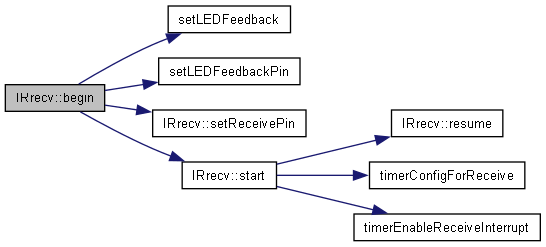
◆ checkForRecordGapsMicros()
| bool IRrecv::checkForRecordGapsMicros | ( | Print * | aSerial | ) |
Checks if protocol is not detected and detected space between two transmissions is smaller than known value for protocols (Sony with around 24 ms)
- Returns
- true, if CheckForRecordGapsMicros() has printed a message, i.e. gap < 15ms (RECORD_GAP_MICROS_WARNING_THRESHOLD)
Definition at line 1513 of file IRReceive.hpp.

◆ checkForRepeatSpaceTicksAndSetFlag()
| void IRrecv::checkForRepeatSpaceTicksAndSetFlag | ( | uint16_t | aMaximumRepeatSpaceTicks | ) |
◆ checkHeader()
| bool IRrecv::checkHeader | ( | PulseDistanceWidthProtocolConstants * | aProtocolConstants | ) |
◆ checkHeader_P()
| bool IRrecv::checkHeader_P | ( | PulseDistanceWidthProtocolConstants const * | aProtocolConstantsPGM | ) |
Definition at line 1309 of file IRReceive.hpp.

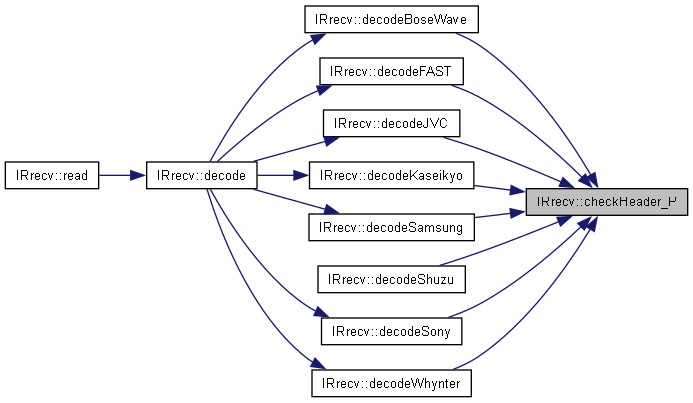
◆ compare()
| uint_fast8_t IRrecv::compare | ( | uint16_t | oldval, |
| uint16_t | newval | ||
| ) |
Compare two (tick) values for Hash decoder Use a tolerance of 20% to enable e.g.
500 and 600 (NEC timing) to be equal
- Returns
- 0 if newval is shorter, 1 if newval is equal, and 2 if newval is longer
Definition at line 1209 of file IRReceive.hpp.

◆ decode()
| bool IRrecv::decode | ( | ) |
The main decode function, attempts to decode the recently receive IR signal.
The set of decoders used is determined by active definitions of the DECODE_<PROTOCOL> macros. Results of decoding are stored in IrReceiver.decodedIRData.* like e.g. IrReceiver.decodedIRData.command.
- Returns
- false if no IR receiver data available, true if data available.
Definition at line 566 of file IRReceive.hpp.
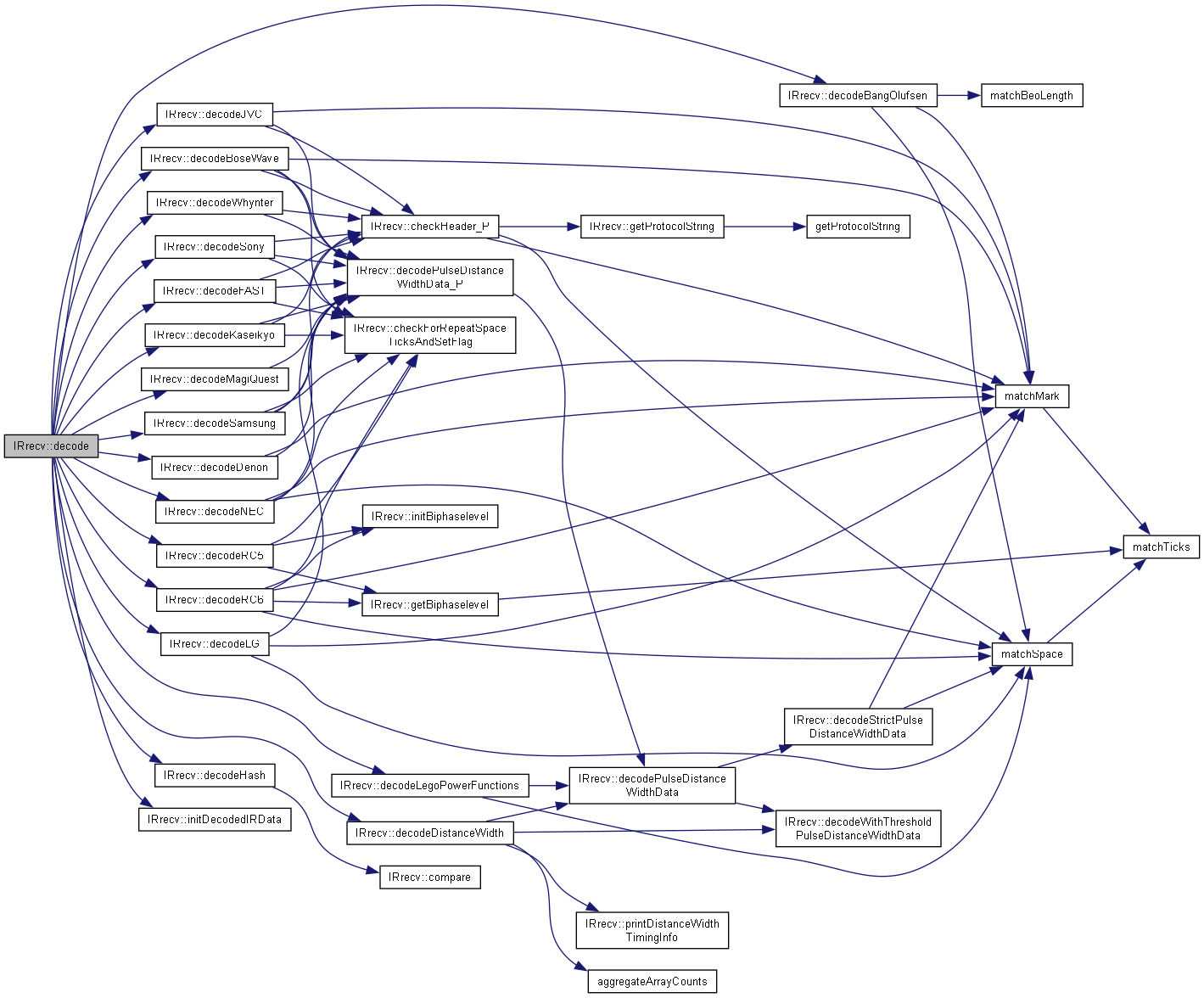

◆ decodeHash()
| bool IRrecv::decodeHash | ( | ) |
Decodes an arbitrary IR code to a 32-bit value.
Instead of decoding using a standard encoding scheme (e.g. Sony, NEC, RC5), the code is hashed to a 32-bit value.
The algorithm looks at the sequence of MARK and SPACE signals, and see if each one is shorter (0), the same length (1), or longer (2) than the previous MARK or SPACE. It hash the resulting sequence of 0's, 1's, and 2's to a 32-bit value. This will give a unique value for each different code (probably), for most code systems.
Uses FNV hash algorithm: http://isthe.com/chongo/tech/comp/fnv/#FNV-param Converts the raw code values into a 32-bit hash code. Hopefully this code is unique for each button. This isn't a "real" decoding, just an arbitrary value.
see: http://www.righto.com/2010/01/using-arbitrary-remotes-with-arduino.html
Definition at line 1236 of file IRReceive.hpp.


◆ decodeHashOld()
| bool IRrecv::decodeHashOld | ( | decode_results * | aResults | ) |
Definition at line 1261 of file IRReceive.hpp.


◆ decodePulseDistanceWidthData() [1/4]
| void IRrecv::decodePulseDistanceWidthData | ( | PulseDistanceWidthProtocolConstants * | aProtocolConstants, |
| uint_fast8_t | aNumberOfBits, | ||
| IRRawlenType | aStartOffset = 3 |
||
| ) |
Decode pulse distance protocols for PulseDistanceWidthProtocolConstants.
- Returns
- true if decoding was successful
Definition at line 1080 of file IRReceive.hpp.

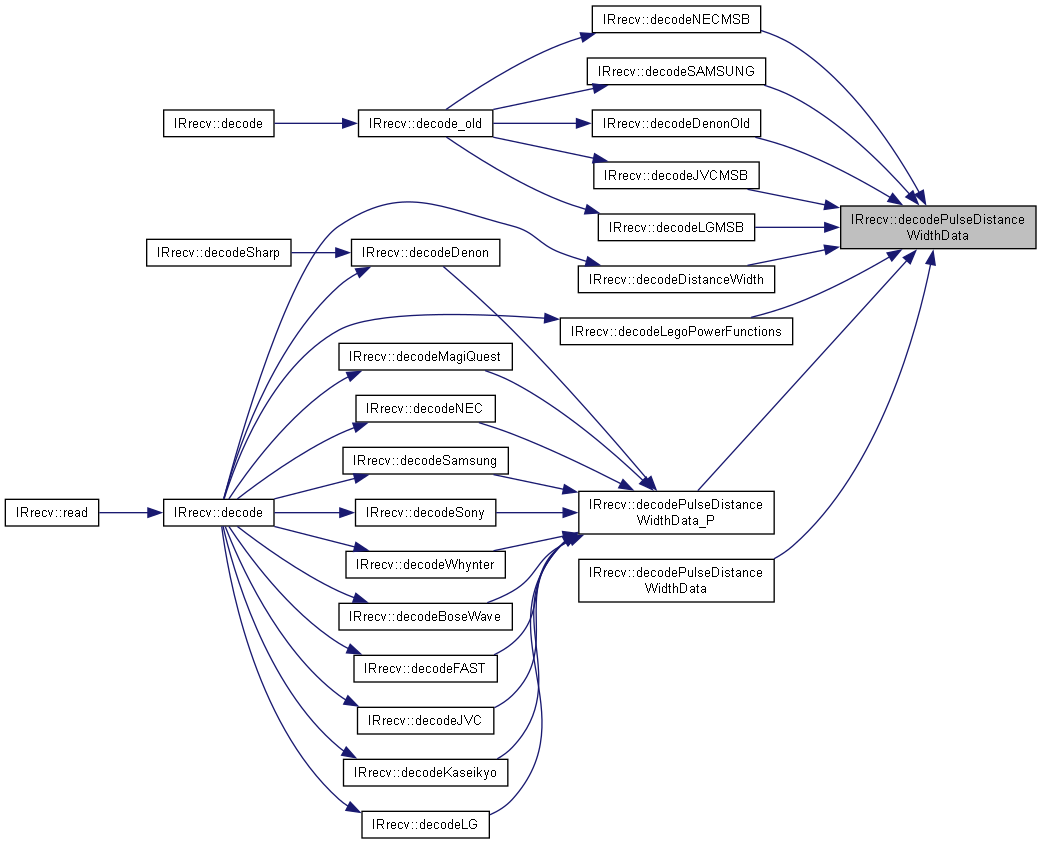
◆ decodePulseDistanceWidthData() [2/4]
| void IRrecv::decodePulseDistanceWidthData | ( | uint_fast8_t | aNumberOfBits, |
| IRRawlenType | aStartOffset, | ||
| uint16_t | aOneMarkMicros, | ||
| uint16_t | aOneSpaceMicros, | ||
| uint16_t | aZeroMarkMicros, | ||
| bool | aMSBfirst | ||
| ) |
Old deprecated version with 3 timing parameters instead of one and a aIsPulseWidthProtocol flag.
Definition at line 881 of file IRReceive.hpp.

◆ decodePulseDistanceWidthData() [3/4]
| void IRrecv::decodePulseDistanceWidthData | ( | uint_fast8_t | aNumberOfBits, |
| IRRawlenType | aStartOffset, | ||
| uint16_t | aOneMarkMicros, | ||
| uint16_t | aZeroMarkMicros, | ||
| uint16_t | aOneSpaceMicros, | ||
| uint16_t | aZeroSpaceMicros, | ||
| bool | aMSBfirst | ||
| ) |
◆ decodePulseDistanceWidthData() [4/4]
| void IRrecv::decodePulseDistanceWidthData | ( | uint_fast8_t | aNumberOfBits, |
| IRRawlenType | aStartOffset, | ||
| uint16_t | aOneMicros, | ||
| bool | aIsPulseWidthProtocol, | ||
| bool | aMSBfirst | ||
| ) |
Decode pulse distance width protocols.
We only check the mark or space length of a 1 against a threshold value, otherwise we always assume a 0! using matchMark() and matchSpace(), which includes MARK_EXCESS_MICROS in comparison.
We can have the following protocol timings PULSE_DISTANCE: Pause/spaces have different length and determine the bit value, longer space is 1. Pulses/marks can be constant, like NEC. PULSE_WIDTH: Pulses/marks have different length and determine the bit value, longer mark is 1. Pause/spaces can be constant, like Sony. PULSE_DISTANCE_WIDTH: Pulses/marks and pause/spaces have different length, often the bit length is constant, like MagiQuest. Can be decoded using the PULSE_DISTANCE decoding.
Input is IrReceiver.irparams.rawbuf[] Output is IrReceiver.decodedIRData.decodedRawData
- Parameters
-
aNumberOfBits Number of bits to decode from irparams.rawbuf[] array. aStartOffset Offset in irparams.rawbuf[] to start decoding. Must point to a mark. aOneMicros Timing value for 1 aIsPulseWidthProtocol If true the aOneThresholdMicros id the mark threshold for 1, otherwise the space threshold aMSBfirst If true send Most Significant Bit first, else send Least Significant Bit (lowest bit) first.
Definition at line 747 of file IRReceive.hpp.

◆ decodePulseDistanceWidthData_P()
| void IRrecv::decodePulseDistanceWidthData_P | ( | PulseDistanceWidthProtocolConstants const * | aProtocolConstantsPGM, |
| uint_fast8_t | aNumberOfBits, | ||
| IRRawlenType | aStartOffset = 3 |
||
| ) |
Definition at line 1116 of file IRReceive.hpp.

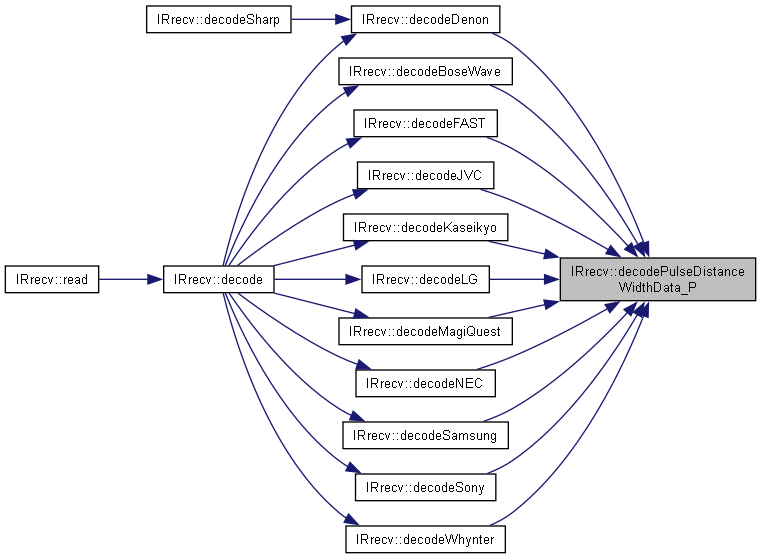
◆ decodeStrictPulseDistanceWidthData()
| bool IRrecv::decodeStrictPulseDistanceWidthData | ( | uint_fast8_t | aNumberOfBits, |
| IRRawlenType | aStartOffset, | ||
| uint16_t | aOneMarkMicros, | ||
| uint16_t | aOneSpaceMicros, | ||
| uint16_t | aZeroMarkMicros, | ||
| uint16_t | aZeroSpaceMicros, | ||
| bool | aMSBfirst | ||
| ) |
Definition at line 957 of file IRReceive.hpp.

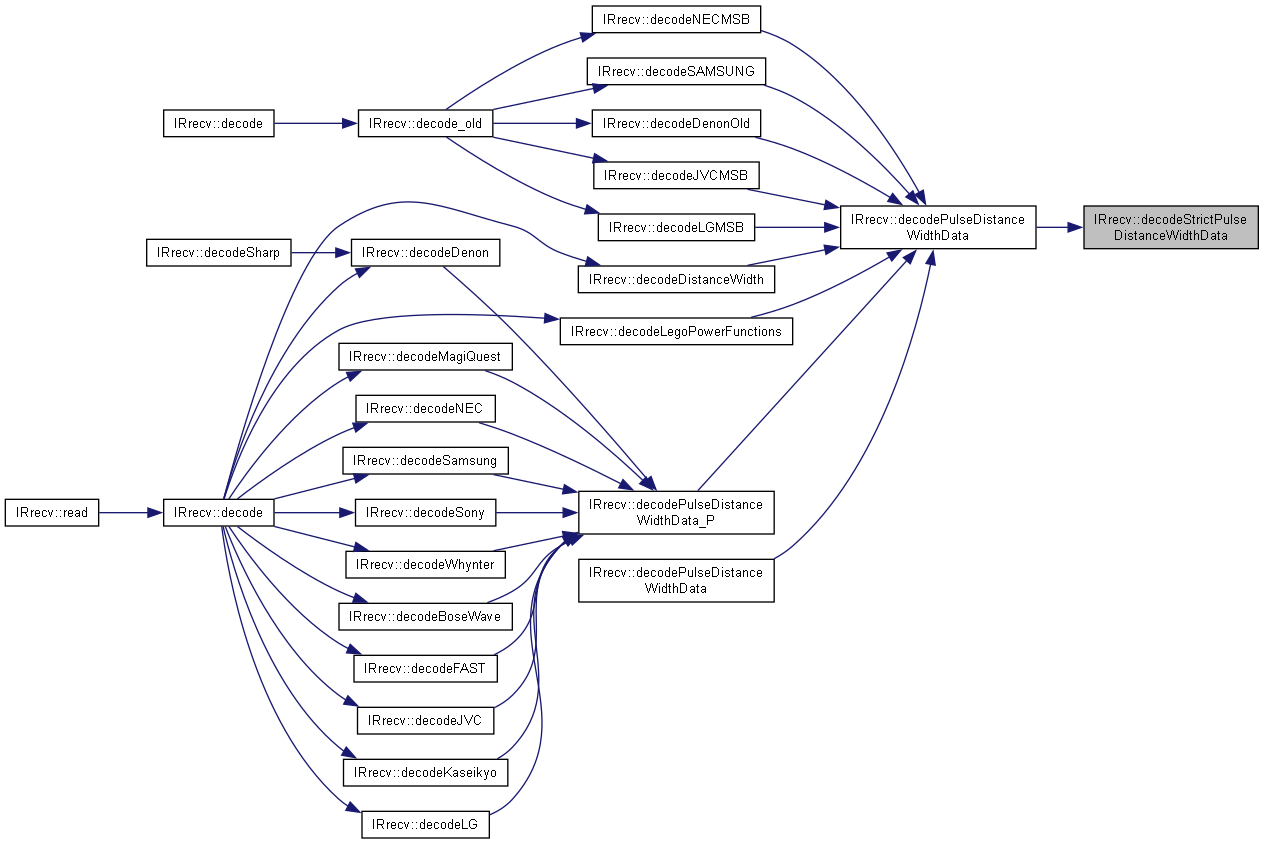
◆ decodeWithThresholdPulseDistanceWidthData()
| void IRrecv::decodeWithThresholdPulseDistanceWidthData | ( | uint_fast8_t | aNumberOfBits, |
| IRRawlenType | aStartOffset, | ||
| uint16_t | aOneThresholdMicros, | ||
| bool | aIsPulseWidthProtocol, | ||
| bool | aMSBfirst | ||
| ) |
New threshold decoder to be activated by USE_THRESHOLD_DECODER Assumes a 0 for shorter and a 1 for longer timing.
Thus the value must be eventually inverted by the calling protocol decoder (MagiQuest). In normal decoder we check the if we have a timing for a 1 (normally the longer timing) within a range of 75 % and 125 % of the nominal timing see TICKS_LOW. Many protocols have a ratio of 1 to 3 between short and long timing. In this case this decoder extends the range to 66% and the upper bound does not matter anyway. I hope that this will give slightly better results especially for
- jittering signals
- protocols with a smaller timing ratio than 1 to 2
- protocols with short 1 pulses / pauses like MagiQuest. Requires up to 458 bytes more program space, if more than 1 protocol is involved. but saves 90 bytes if only e.g. NEC is selected.
- Parameters
-
aNumberOfBits Number of bits to decode from irparams.rawbuf[] array. aStartOffset Offset in irparams.rawbuf[] to start decoding. Must point to a mark. aOneThresholdMicros Threshold value for 1 aIsPulseWidthProtocol If true the aOneThresholdMicros id the mark threshold for 1, otherwise the space threshold aMSBfirst If true send Most Significant Bit first, else send Least Significant Bit (lowest bit) first.
Definition at line 827 of file IRReceive.hpp.
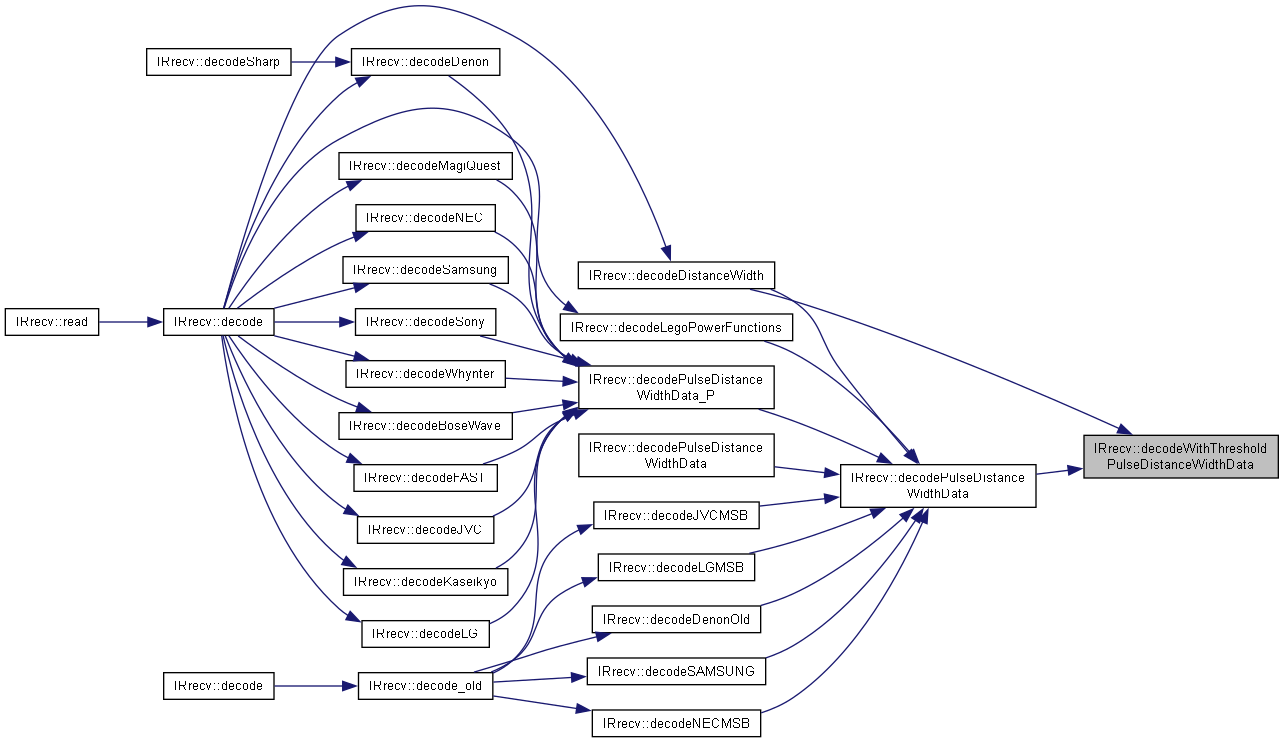
◆ disableIRIn()
| void IRrecv::disableIRIn | ( | ) |
Alias for stop().
Definition at line 481 of file IRReceive.hpp.

◆ enableIRIn()
| void IRrecv::enableIRIn | ( | ) |
Alias for start().
Definition at line 417 of file IRReceive.hpp.

◆ end()
| void IRrecv::end | ( | ) |
Alias for stop().
Definition at line 487 of file IRReceive.hpp.

◆ getBiphaselevel()
| uint_fast8_t IRrecv::getBiphaselevel | ( | ) |
Gets the level of one time interval (aBiphaseTimeUnit) at a time from the raw buffer.
The RC5/6 decoding is easier if the data is broken into time intervals. E.g. if the buffer has mark for 2 time intervals and space for 1, successive calls to getBiphaselevel will return 1, 1, 0.
_ _ _ _ _ _ _ _ _ _ _ _ _
_____| |_| |_| |_| |_| |_| |_| |_| |_| |_| |_| |_| |_| |
^ ^ ^ ^ ^ ^ ^ ^ ^ ^ ^ ^ ^ Significant clock edge
_ _ _ ___ _ ___ ___ _ - Mark
Data _____| |___| |_| |_| |_| |___| |___| |_| | - Data starts with a mark->space bit 1 0 0 0 1 1 0 1 0 1 1 - Space A mark to space at a significant clock edge results in a 1 A space to mark at a significant clock edge results in a 0 (for RC6) Returns current level [MARK or SPACE] or -1 for error (measured time interval is not a multiple of sBiphaseTimeUnit).
Definition at line 1156 of file IRReceive.hpp.


◆ getMarkExcessMicros()
| int getMarkExcessMicros | ( | ) |
Getter function for MARK_EXCESS_MICROS.
Definition at line 1504 of file IRReceive.hpp.

◆ getProtocolString()
| const char* getProtocolString | ( | decode_type_t | aProtocol | ) |
◆ initBiphaselevel()
| void IRrecv::initBiphaselevel | ( | uint_fast8_t | aRCDecodeRawbuffOffset, |
| uint16_t | aBiphaseTimeUnit | ||
| ) |
◆ initDecodedIRData()
| void IRrecv::initDecodedIRData | ( | ) |
Is internally called by decode before calling decoders.
Must be used to setup data, if you call decoders manually.
Definition at line 514 of file IRReceive.hpp.

◆ IRReceiveTimerInterruptHandler()
| void IRReceiveTimerInterruptHandler | ( | ) |
◆ isIdle()
| bool IRrecv::isIdle | ( | ) |
Returns status of reception.
- Returns
- true if no reception is on-going.
Definition at line 495 of file IRReceive.hpp.
◆ MATCH()
| bool MATCH | ( | uint16_t | measured_ticks, |
| uint16_t | desired_us | ||
| ) |
◆ MATCH_MARK()
| bool MATCH_MARK | ( | uint16_t | measured_ticks, |
| uint16_t | desired_us | ||
| ) |
◆ MATCH_SPACE()
| bool MATCH_SPACE | ( | uint16_t | measured_ticks, |
| uint16_t | desired_us | ||
| ) |
◆ matchMark()
| bool matchMark | ( | uint16_t | aMeasuredTicks, |
| uint16_t | aMatchValueMicros | ||
| ) |
Compensate for marks exceeded by demodulator hardware.
- Returns
- true, if values match
Definition at line 1411 of file IRReceive.hpp.

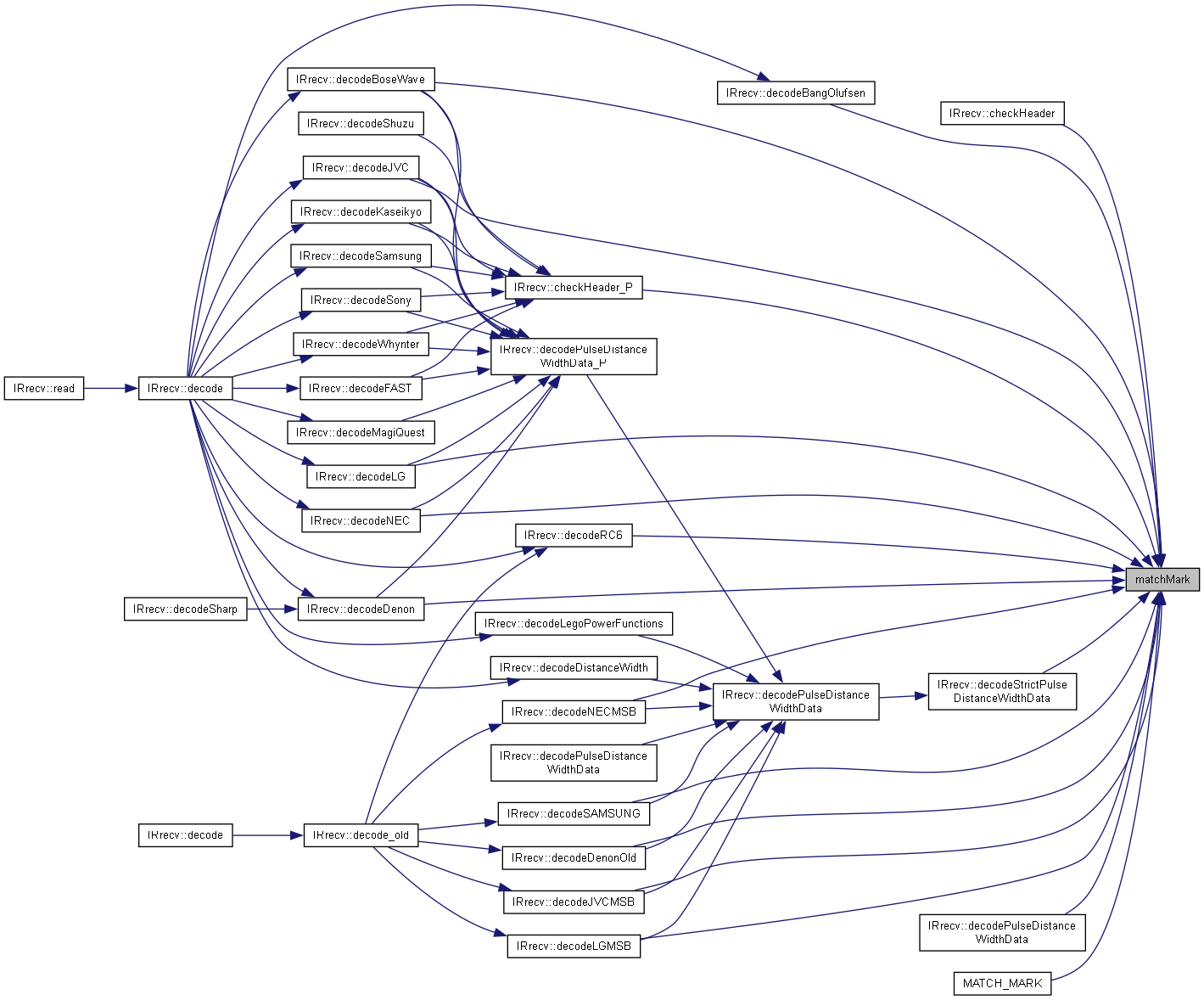
◆ matchSpace()
| bool matchSpace | ( | uint16_t | aMeasuredTicks, |
| uint16_t | aMatchValueMicros | ||
| ) |
Compensate for spaces shortened by demodulator hardware.
- Returns
- true, if values match
Definition at line 1459 of file IRReceive.hpp.

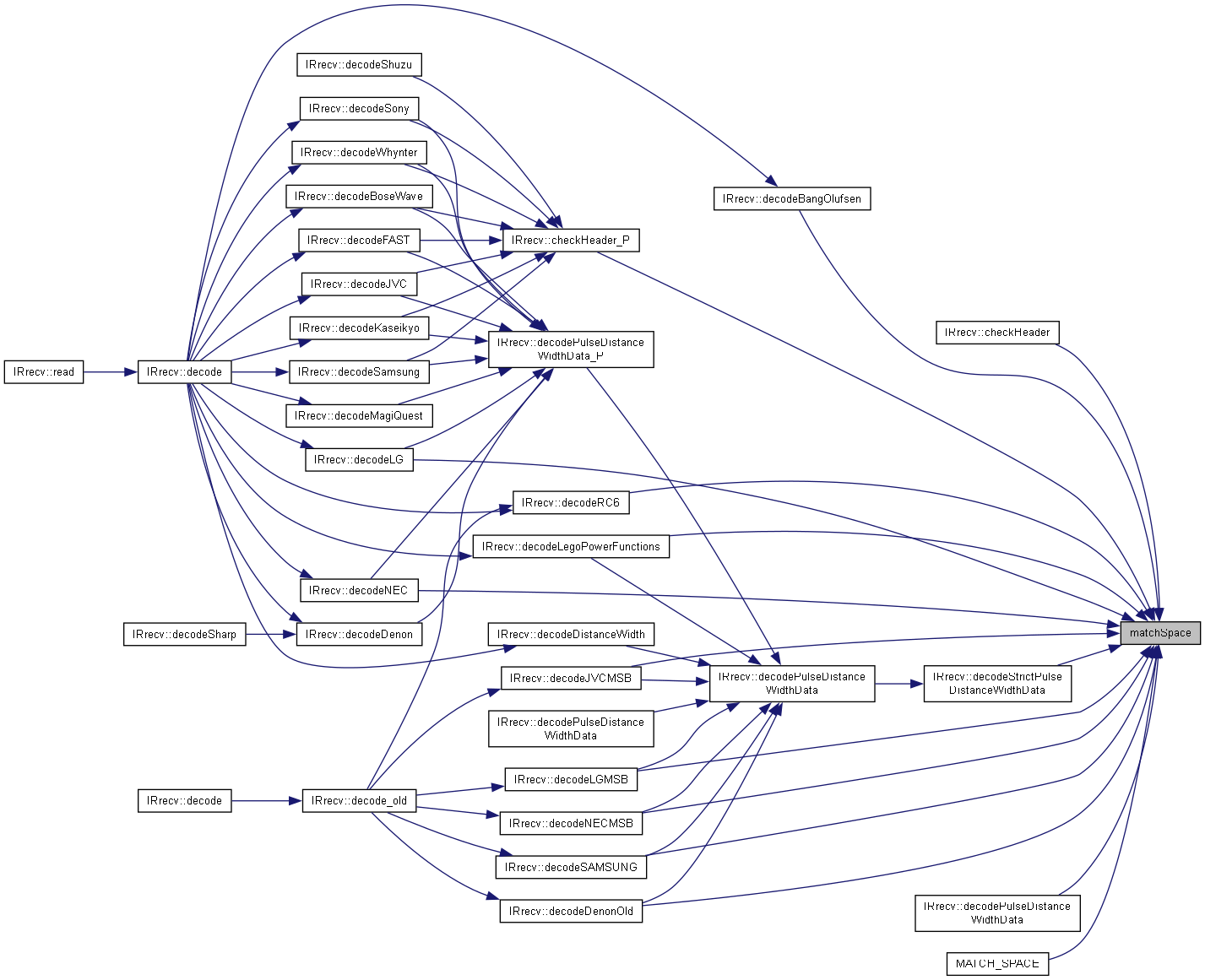
◆ matchTicks() [1/2]
| bool matchTicks | ( | uint16_t | aMeasuredTicks, |
| uint16_t | aMatchValueMicros | ||
| ) |
Match function WITHOUT compensating for marks exceeded or spaces shortened by demodulator hardware.
- Returns
- true, if values match
Definition at line 1348 of file IRReceive.hpp.
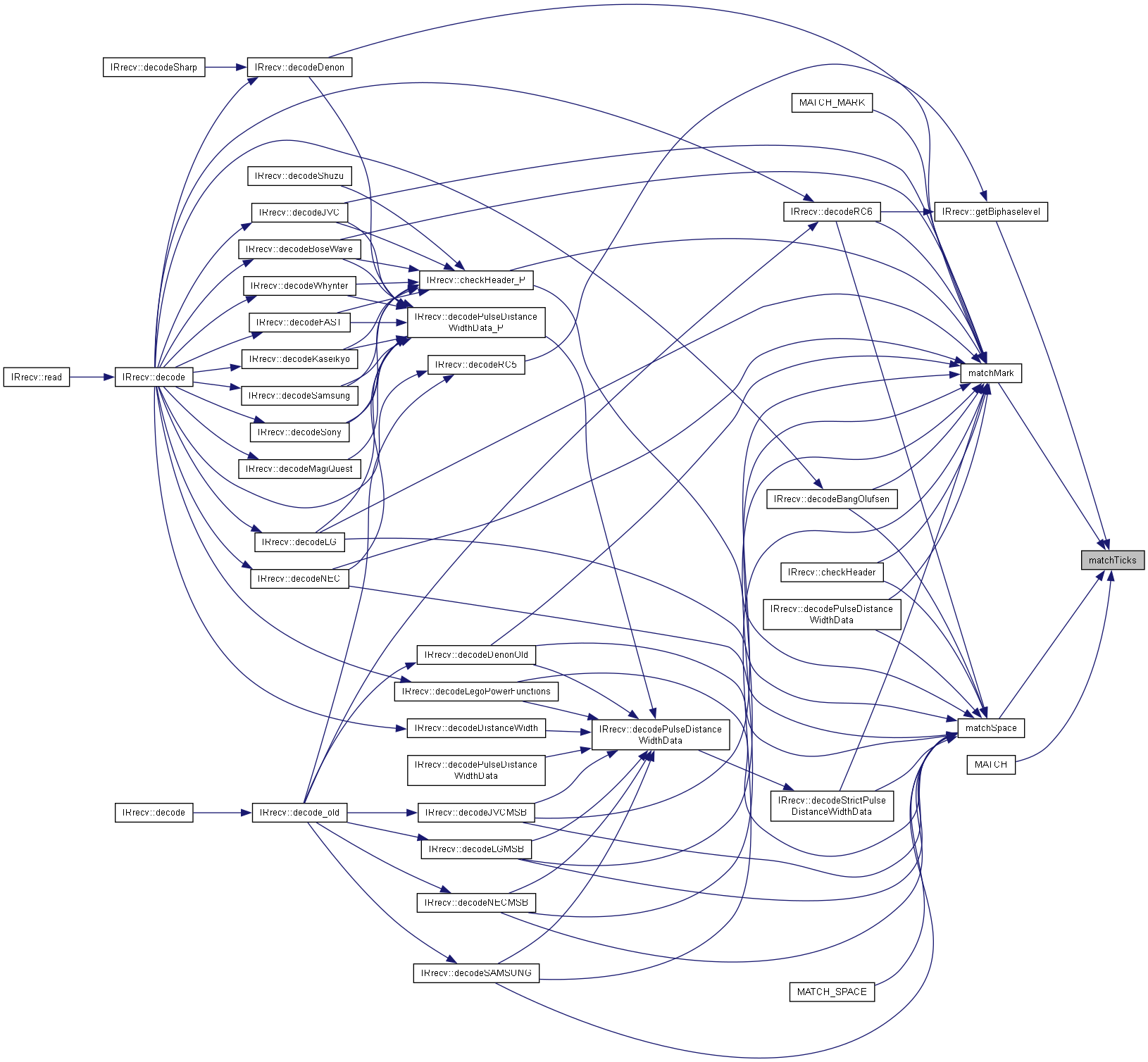
◆ matchTicks() [2/2]
| bool matchTicks | ( | uint16_t | aMeasuredTicks, |
| uint16_t | aMatchValueMicros, | ||
| int16_t | aCompensationMicrosForTicks | ||
| ) |
Match function WITH compensating for marks exceeded or spaces shortened by demodulator hardware.
- Returns
- true, if values match
Definition at line 1378 of file IRReceive.hpp.
◆ printActiveIRProtocols() [1/2]
|
static |
Definition at line 1538 of file IRReceive.hpp.
◆ printActiveIRProtocols() [2/2]
| void printActiveIRProtocols | ( | Print * | aSerial | ) |
Definition at line 1546 of file IRReceive.hpp.
◆ read()
| IRData * IRrecv::read | ( | ) |
Returns pointer to IrReceiver.decodedIRData if IR receiver data is available, else nullptr.
Definition at line 549 of file IRReceive.hpp.
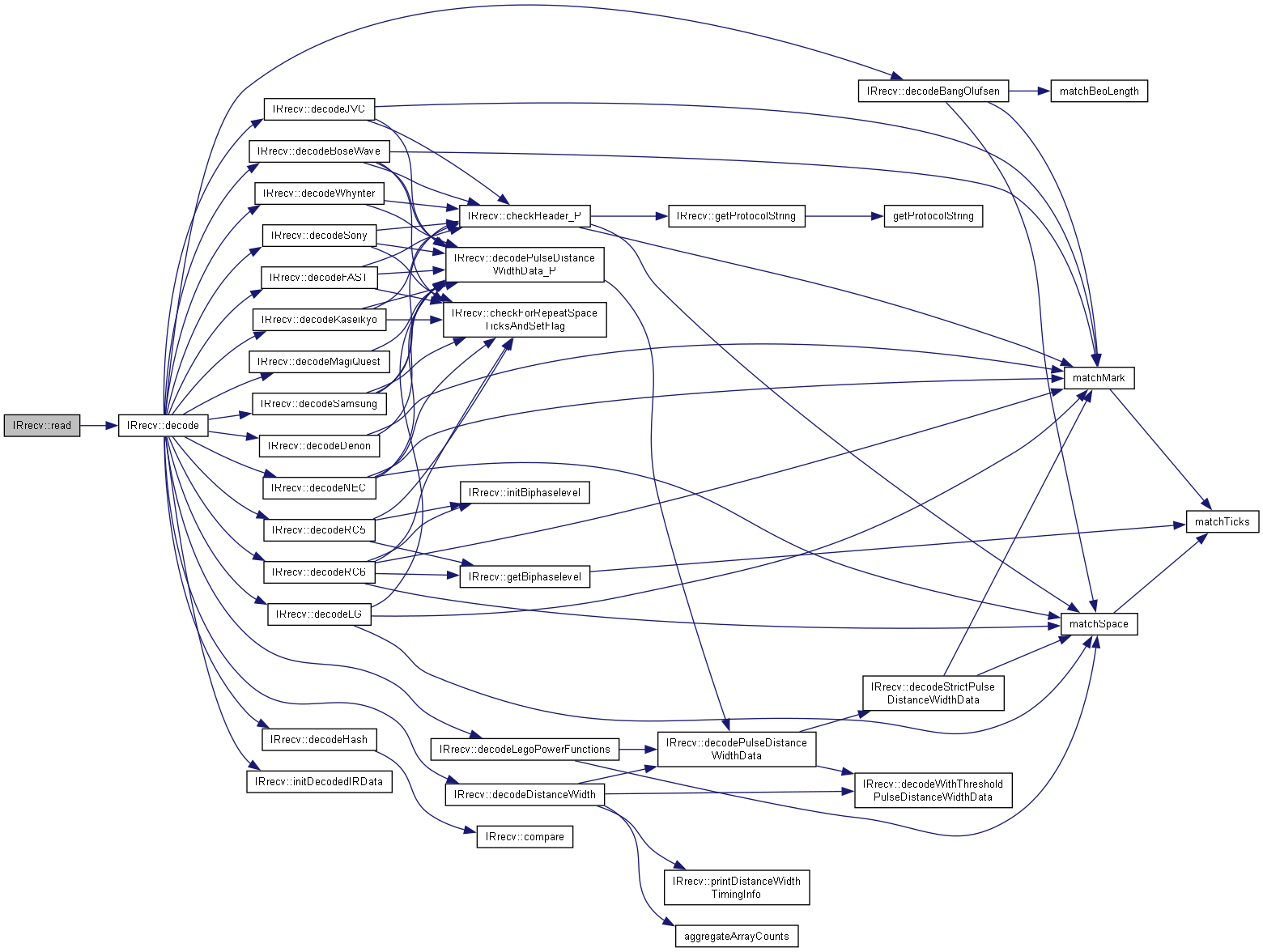
◆ ReceiveInterruptHandler()
| void IRrecv::ReceiveInterruptHandler | ( | ) |
Definition at line 121 of file IRReceive.hpp.


◆ registerReceiveCompleteCallback()
| void IRrecv::registerReceiveCompleteCallback | ( | void(*)(void) | aReceiveCompleteCallbackFunction | ) |
Sets the function to call if a complete protocol frame has arrived.
Definition at line 373 of file IRReceive.hpp.
◆ restartAfterSend()
| void IRrecv::restartAfterSend | ( | ) |
Restarts receiver after send.
Is a NOP if sending does not require a timer.
Definition at line 458 of file IRReceive.hpp.

◆ restartTimer() [1/2]
| void IRrecv::restartTimer | ( | ) |
◆ restartTimer() [2/2]
| void IRrecv::restartTimer | ( | uint32_t | aMicrosecondsToAddToGapCounter | ) |
Configures the timer and the state machine for IR reception.
Does not call resume()! We assume, that timer interrupts are disabled here, otherwise it makes no sense to use this functions. Therefore we do not need to guard the change of the volatile TickCounterForISR here :-). The tick counter value is already at 100 when decode() gets true, because of the 5000 us minimal gap defined in RECORD_GAP_MICROS. If TickCounterForISR is not adjusted with the value of the microseconds, the timer was stopped, it can happen, that a new IR frame is recognized as a repeat, because the value of RECORD_GAP_MICROS was not reached by TickCounterForISR counter before receiving the new IR frame.
- Parameters
-
aMicrosecondsToAddToGapCounter To compensate for the amount of microseconds the timer was stopped / disabled.
Definition at line 431 of file IRReceive.hpp.

◆ restartTimerWithTicksToAdd()
| void IRrecv::restartTimerWithTicksToAdd | ( | uint16_t | aTicksToAddToGapCounter | ) |
Configures the timer and the state machine for IR reception.
Does not call resume()!
- Parameters
-
aTicksToAddToGapCounter To compensate for the amount of ticks the timer was stopped / disabled.
Definition at line 443 of file IRReceive.hpp.

◆ resume()
| void IRrecv::resume | ( | ) |
Restart the ISR (Interrupt Service Routine) state machine, to enable receiving of the next IR frame.
Internal counting of gap timing is independent of StateForISR and therefore independent of call time of resume().
Definition at line 503 of file IRReceive.hpp.
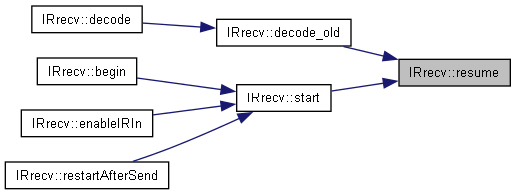
◆ setReceivePin()
| void IRrecv::setReceivePin | ( | uint_fast8_t | aReceivePinNumber | ) |
Sets / changes the receiver pin number.
Definition at line 335 of file IRReceive.hpp.

◆ start()
| void IRrecv::start | ( | ) |
Start the receiving process.
This configures the timer and the state machine for IR reception and enables the receive sample timer interrupt which consumes a small amount of CPU every 50 us.
Definition at line 383 of file IRReceive.hpp.
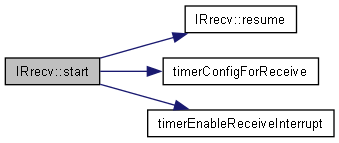
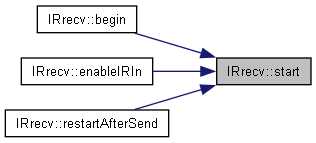
◆ stop()
| void IRrecv::stop | ( | ) |
Disables the timer for IR reception.
Definition at line 467 of file IRReceive.hpp.


◆ stopTimer()
| void IRrecv::stopTimer | ( | ) |
Variable Documentation
◆ IrReceiver
| IRrecv IrReceiver |
The receiver instance.
Definition at line 63 of file IRReceive.hpp.
◆ PROGMEM
| const char* const ProtocolNames [] PROGMEM = "UNKNOWN" |
Definition at line 46 of file IRProtocol.hpp.
◆ ProtocolNames
| const char *const ProtocolNames |
Definition at line 83 of file IRProtocol.hpp.
◆ sBiphaseCurrentTimingIntervals
| uint16_t sBiphaseCurrentTimingIntervals |
Definition at line 1130 of file IRReceive.hpp.
◆ sBiphaseDecodeRawbuffOffset
| uint_fast8_t sBiphaseDecodeRawbuffOffset |
Definition at line 1129 of file IRReceive.hpp.
◆ sBiphaseTimeUnit
| uint16_t sBiphaseTimeUnit |
Definition at line 1132 of file IRReceive.hpp.
◆ sBiphaseUsedTimingIntervals
| uint_fast8_t sBiphaseUsedTimingIntervals |
Definition at line 1131 of file IRReceive.hpp.
◆ sMicrosAtLastStopTimer
| unsigned long sMicrosAtLastStopTimer = 0 |
Definition at line 69 of file IRReceive.hpp.

